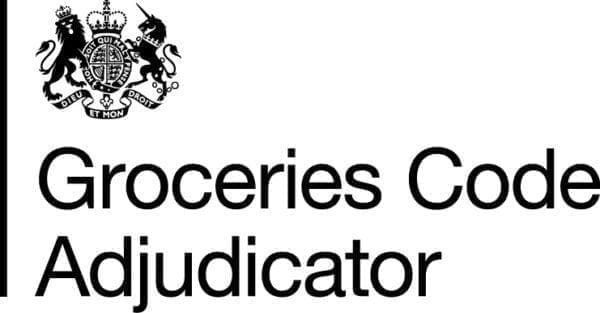Podcast: Play in new window | Download
Discussing the New Grocery Code Adjudicator
Mark White has taken-over from Christine Tacon. What will the new grocery code adjudicator want from the named retailers? And will he name Amazon in 2021?
You Can Read the Full New Grocery Code Adjudicator Episode Transcript Below:
Darren A. Smith:
Welcome to week four of The Grocery Guru with our grocery guru, Andrew Grant, hello.
Andrew Grant:
Hi, Darren, how are you?
Darren A. Smith:
I’m good. We’re not even going to talk about L-O-C-K, up or down. Not mentioning it, not allowed.
Andrew Grant:
Okay, day one, 26 to go.
Darren A. Smith:
He mentioned it. Okay, moving swiftly on. So we’ve talked about Urban Fulfillment Centers. We’ve talked about Category Management is Dead. What are we talking about this week?
Andrew Grant:
Oh, you missed week three.
Darren A. Smith:
Oh God, we did.
Andrew Grant:
Well, we were talking about what we can’t talk about, and how-

Darren A. Smith:
Yes.
Andrew Grant:
Yes, and how difficult Christmas is going to be. And if you think about it, we spoke about that last Thursday and it was on Saturday morning we all found out, that actually our worst fears, even worst fears were coming true.
Darren A. Smith:
I know. Do you see what I did there? I didn’t even talk about it. I just went straight over it. What are we talking about this week?
Andrew Grant:
Okay. Let’s say how up with the latest grocery-news you are. I want to talk about the latest grocery kid on the block. A gentleman by the name of Mr Mark White. Any ideas?
Darren A. Smith:
I think you’ll talk about the GCA or the Groceries Code Adjudicator, also known as the Grocery [Tsar 00:00:01:22], am I right?
Andrew Grant:
Oh, very good. Yes, you obviously read your industry news or you’ve got the right alert set up on your phone. Yes, Mark White took over as the UK’s second Groceries Code Adjudicator on Monday [crosstalk 00:00:01:41]-
Darren A. Smith:
Okay, so the previous one was Christine Tacon, is that right?
Andrew Grant:
Christine who we all know very well. She had spent what? Five years, actually, five years in the role, essentially defining what the code was. Because when she started, it was just this big blob of legislation that was completely new to the UK. Nobody quite knew what it was, what it would do. And she put, breathed life into it, and breathed form and focus into it, I guess.
Darren A. Smith:
All right. So just for everyone who thinks, “What the hell are these guys talking about?” And if you’re in the world of UK grocery, you really need to know this stuff. So I’m just going to test my knowledge a bit and check with Andrew, who is the guru? So I think the order was passed in parliament in 2009? And the order was 16 pages of law that contained [GSCOP], did I get some of that right?
Andrew Grant:
Yeah. Part of the Enterprise Act, which went legal in 2010, although it went through parliament in 2009. So you are correct.
Darren A. Smith:
Cool, cool. So it’s roughly 16 pages, GSCOP was five pages of this order. GSCOP was the bit we all talk about and GSCOP is a piece of law that encourages suppliers to, sorry encourages supermarkets to look after their suppliers more, fairly?
Andrew Grant:
I wouldn’t say, “Encourage,” because it’s a law, it’s mandated. But yeah, the reason it was essentially brought into existence was this perception, whether it’s the perception of reality, that supermarkets would use their buying power to exploit suppliers needlessly.
Darren A. Smith:
Okay.
Andrew Grant:
And-
Darren A. Smith:
What … Sorry, go on.
Andrew Grant:
No, I was going to say, you only have to read the press over the years about bully boy-tactics, et cetera. You and I being in the industry, probably in typical tabloid-fashion, slightly exaggerated.
Darren A. Smith:
Yeah, slightly. All right. So the other part I wanted to dispel, is the myth. Now, when you and I do training, and we do training with a lot of people on GSCOP Competition Law. One of the big myths is that suppliers are bound by this. They’re not.
Andrew Grant:
Yeah, that’s the number one, the number one myth, are suppliers think they’re covered by the code and get all scared that they could be in some legal dispute as a result of breaking the code. The good news is no. Only 13, currently, 13 named grocery retailers. So those 13, you can run off your fingers the usual suspects, Tesco, Aldi, Sainsbury’s, Asda, Iceland, Waitrose are all covered by the code. And only those 13 can break GSCOP, break the law if you like when it comes to GSCOP.
Darren A. Smith:
All right.
Andrew Grant:
Suppliers can’t.
Darren A. Smith:
And if they break the law, the potential fine is big, isn’t it?
Andrew Grant:
It’s not as bad as Competition Law, being caught trying to fix prices or manipulate retail pricing, which is 10% of your global turnover. You breach GSCOP, it’s 1% of your UK-turnover.
Andrew Grant:
Still a pretty big hit for the likes of a Tesco or Sainsbury’s or an Asda.
Darren A. Smith:
Okay. All right, let’s come back to the original point then. So we’ve got a new tsar in play, in the chair. What’s his background.
Andrew Grant:
Yeah, interestingly, so Christine Tacon, the previous adjudicator, had a retailer and farming background. So she was the Co-Op’s farming manager and basically was that link between the Co-Op’s farms and the Co-Op. So she was pretty well ingrained in all the supply chain practices that a food supplier would go through to serve one of the big grocers. Mark’s background is very much legal background. So he was, I think, his last role was a legal counsel to Compass Group, the big catering group. So, inevitably, a new set of boots on the carpet, there will be some form of change I imagine, and it would be interesting to see.
Darren A. Smith:
Now we had a quick catch up before we started this, and you said to me something about all house-training. What was the term you used there? I thought, I [inaudible 00:06:21].
Andrew Grant:
Yeah, just really interesting. The press release that the government put out on Monday, confirming his appointment. Yeah, pretty standard stuff. “We welcome Mark to the grocery code. We pay tribute to the fantastic job Christine did.” But then Mark said amongst the usual stuff, “Delighted to be joining this and a great time to join, and lots of challenges,” is, “I look forward to driving a whole-house approach to retailer compliance, including training.
Andrew Grant:
So that’s an interesting choice of words for me because, in terms of compliance for retailers, it’s their commercial teams that are the people who have to comply, formally, legally, have to comply and be trained every year in the code. So that’s a legal requirement of the code, are all commercial executives in those 13 named retailers have to be trained in GSCOP, when they’re appointed and every year and repeated. Mark seems to be signalling that he wants to take whole of house-approach. So I assume that means supply chain, logistics, marketing, not checkout-staff because otherwise, there are 200,000 odd people that work at Tesco.
Andrew Grant:
Yeah, quite an opportunity for training actually, given what we do, Darren.
Darren A. Smith:
You’re going to get a thumbs up from me. So if I put that back to my language, if I’m a Tesco-buyer, I get trained in GSCOP every year and an I have to be by law. Mark’s potential approach is that my colleague inside the supply chain might also now need to be trained every year. Might. And that may even go slightly wider from buying to supply chain to other functions within supermarkets?
Andrew Grant:
I guess. And it’s this extension of what Christine Tacon called, “Her collaborative approach.” I don’t think Mark will be able to change the law, to say everybody that works for a Tesco or an Asda or a Sainsbury’s must be trained in the code. I don’t think that will happen, but, I think, I could see an argument where he says, “Look, okay, at the moment, you have to train your commercial teams, but actually somebody in supply chain or marketing could inadvertently break the code, because of honest ignorance. So actually, retailers, it would be in your interest in a collaborative way, if you trained much more, particularly of your support, central head office-functions so that they don’t accidentally break the code.”
Darren A. Smith:
Okay. All right. That’s a good point. And let me just extend that, because I’m just aware of our time. If I’m a supplier, now obviously I can’t break the code. We’ve said that. That doesn’t change. What do I need to do to get ahead of this?
Andrew Grant:
Well, I think, Mark said in one of his joining statements, there’s still circa 50% of suppliers to the UK supermarkets, who’ve had no training in the code. Which in theory means they don’t understand what protections they have under the code. And if you do understand the code, if you are trained in the code as a supplier, the code does give you some relatively important protections from some of the more extreme buying practices that some retailers, historically, have got up to.
Darren A. Smith:
Also by understanding the code, a supplier can help encourage a supermarket if they might be going outside the code, to come back within.
Andrew Grant:
Yeah, I guess, yeah. Flag up as a yellow card, rather than go straight to a red card, I guess. Yeah, if you want to use that analogy.
Darren A. Smith:
Yeah. Okay, all right. That makes sense. So GSCOP, wider, suppliers. Okay, and the other bit that I was thinking of, just last bit, was the other fact, is the written supplier agreement. Now I can’t remember the facts, but how many suppliers still don’t have one?
Andrew Grant:
Oh, thank you for that. I can’t remember.
Darren A. Smith:
I think it’s roughly a third, but I thought you might know-
Andrew Grant:
I was going to say a third, I’ve got 50% for not having trained. And then about a third have not got the most important protection that the code gives you, which is this requirement that, if you ask as a supplier, that you have a code-compliant, written supply-agreement with your retailer.
Darren A. Smith:
And the bit that really surprises me is this thing is now a decade old and we’ve still got, let’s call it, a third of suppliers, it might be 40%, who still don’t have one of these protective written supply-agreements that can really help them.
Andrew Grant:
Absolutely. And yeah. Why not? Why not doing a last 15 seconds of advertising? It is what we do. So if you’re watching this and you wonder what we’ve talked about for the last 10 minutes, pick up the phone or drop us an email.
Darren A. Smith:
Cool, all right. Well, we do have the GSCOP-helpline as well. So Andrew, thank you very much. Do you have a cliffhanger for next week or are you going to keep it close to your chest?
Andrew Grant:
I think we’ve got used to a cliffhanger being a cliffhanger.
Darren A. Smith:
Oh, he’s left us cold. Nothing.
Andrew Grant:
Because obviously, this is about what is the latest news in grocery. If the news hasn’t happened, unfortunately-
Andrew Grant:
… I haven’t got the proverbial crystal ball.
Darren A. Smith:
All right, okay. Last bit, fingers crossed for Biden versus Trump. Was that too political?
Andrew Grant:
That’s too political. I’m …
Darren A. Smith:
We’ll see you next week, the grocery guru for episode five. Andrew, you take care.
Andrew Grant:
Cheers, Darren. Bye-bye.
Darren A. Smith:
Bye.


